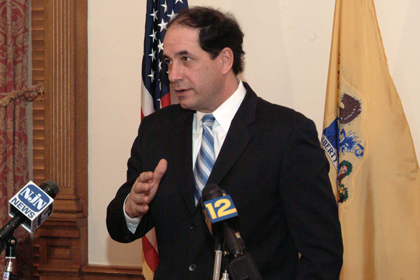
A bill sponsored by Senate Health, Human Services and Senior Citizens Committee Chairman Joseph F. Vitale that would require health care facilities to offer flu shots to their employees was approved today by the full Senate, receiving final legislative approval.
“A flu epidemic could be a nightmare for our state’s health care industry, but one that is easily remedied by providing health care workers with access to flu shots,” said Senator Vitale, D-Middlesex. “Additionally, patients servicing these facilities should be confident that when they are at their most vulnerable to the illness that they will not contract the flu from the health care professionals who are caring for them. It is therefore health care facilities professional and ethical responsibility to provide access to the influenza vaccine for the health and wellbeing of their patients and their employees.”
The bill, S-1464, would require state licensed health care facilities including hospitals, nursing homes and home health care agencies to establish and implement an annual influenza vaccination program. Each facility would be required to provide either on- or off-site flu vaccination for its health care workers, unless an employee provides documentation of current flu vaccination or signs a written statement declining a vaccination. The facilities would be required to maintain records of influenza vaccinations for each of its health care workers.
Health care facilities would additionally be required to provide an educational component to the program that informs their employees of the benefits of flu vaccines, non-vaccine flu control measures, and the symptoms, transmission and potential impact of the flu. The legislation requires health care facilities to conduct an annual review of the program with the goal of improving the rate of influenza vaccination among their health care workers. A health care facility would be able to suspend its annual offering of influenza vaccines if there is determined to be a shortage of available vaccines by the Commissioner of Health and Senior Services.
“The worst possible situation for a health care agency, whether it is a hospital, a nursing home or a home health care agency, would be for its employees to be unable to care for patients because they are home sick,” added Senator Vitale. “The men and women who serve on the front lines of our health care system such as doctors, nurses, technicians and aides, are highly susceptible to the illness, particularly if they have not been immunized. In a bad flu year, facilities often see increased patient loads. The last thing that these facilities need is to see absenteeism spike and worker shortages because their staff has the flu.”
Numerous cases involving a lack of influenza-vaccinated health care workers are well documented and have resulted in the introduction and spread of the flu into health care facilities. In one such case, occurring during the 1991-92 flu season, a New York nursing home had a severe influenza outbreak with 65 of their residents infected, resulting in 34 cases of influenza-related pneumonia, 19 hospitalized residents and ultimately two deaths. Only 10 percent of the nursing home’s health care staff had received an influenza vaccination.
According to the Centers for Disease Control and Prevention (CDC), only 66.9 percent of health care workers received an influenza vaccine during the 2011-2012 flu season. Senator Vitale notes that given health care workers’ close contact with patients with weakened immunities and the ease of access to which they could receive an influenza vaccine, these numbers should be substantially higher.
The bill was approved by the Senate with a vote of 35-2. The Assembly approved the legislation in May with a vote of 55-17-5. It now heads to the Governor.

